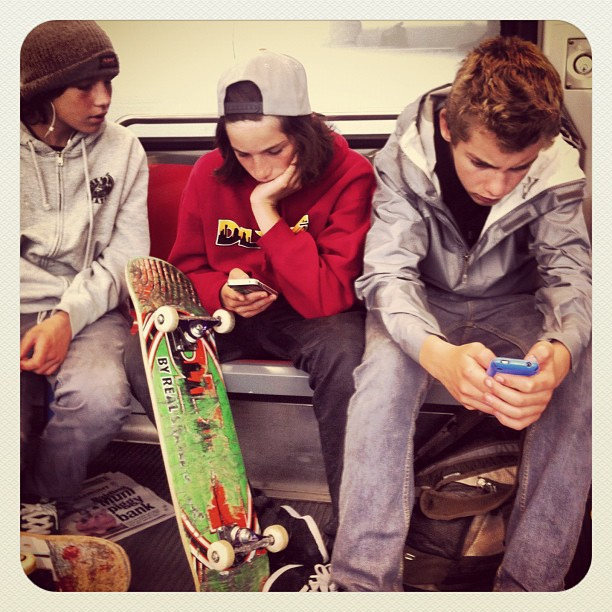Like this article? rabble is reader-supported journalism. Chip in to keep stories like these coming.
Snapchat and selfies, iPhones and iPads… There’s no denying technology plays a major role in the lives of many 21st century children. With so many parents sharing photos of their children from birth and beyond, and kids creating Facebook accounts at age 13 and under, many young people are growing up with their entire lives documented on social media.
Although technological advances can facilitate education and learning, the long-term effects of digital living on children’s health have yet to be determined. Many devices like smartphones are relatively new, especially in developing countries, but in North America, where some children get cellphones in Grade 3, Generation Z will spend more waking hours interacting in the digital world than any generation before.
It seems obvious: If your daily routine consists of constantly checking text messages and Facebook “likes,” your ability to focus for long periods will probably decrease. With children spending half as much time in nature as in 1992, and teenagers sitting for close to eight hours a day in front of screens, our kids don’t have much time for fresh air.
That’s why the David Suzuki Foundation created this fall’s Back to School Superhero Challenge. Participants receive a weekly outdoor activity and “superhero” mission that encourages environmental responsibility by getting kids outside to connect with nature.
A growing body of research confirms the health benefits of getting outside. Kids who spend time in nature every day are healthier, happier, more creative, less stressed and more alert than those who don’t. As parents, grandparents, caregivers and educators, it’s our responsibility to raise kids with healthy nature habits.
I remember growing up in London, Ontario, in the early 1950s. Back doors would open between 5:30 and 6 p.m., and parents would call their kids home for dinner. We’d be out playing in the park, empty lot or nearby ditch or creek. There wasn’t a London television station, and the few folks with TV sets had to capture signals from Cleveland or Detroit and watch shadowy black-and-white images made worse by electronic snow. There were no computers, cellphones, iPods or digital anything. Our fun was outdoors.
Some of my earliest, fondest memories are of going fishing and camping with my dad. He was a great role model. He encouraged me to explore the outdoors, play in the dirt and discover all that nature had to offer. He instilled a deep love and appreciation of nature in me, one that I cherish and credit for my career.
I’ve tried to instill this love of nature in my children and grandchildren. From fishing trips to hikes to dinner table discussions about why there are fewer fish in the oceans, we’ve tried to guide them to care about issues that matter.
I’m proud to say it’s paid off. As a marine biologist, my daughter Sarika is working to protect the oceans and the life they support. I’ve stood on protest lines against pipeline expansion with my daughter Tamiko and her kids, Midori and Tamo Campos. And I still recall with pride the speech my daughter Severn gave at the 1992 UN Earth Summit in Rio de Janeiro, Brazil, when she was just 12. She spoke with such conviction that delegates were moved to tears. More than 23 years later, Severn has two young children, and the video of her speech is still making the rounds, inspiring people around the world. Its popularity speaks to the power young people have to affect the world’s most pressing issues.
I often worry what the future will hold for my grandchildren. I sometimes feel a sense of failure when I consider the planet they’ll be inheriting. Will they run in a green forest and breathe clean air? Will they swim in clear waters and discover underwater creatures?
I also have faith that the next generation will include a lot of smart, savvy and socially conscious people who will help protect the planet that we’ve treated so badly. By helping young people get outdoors, care about others and make a difference, we won’t just be raising healthier and happier children, we’ll be raising a generation of superheroes for our planet.
Let’s all get outside and save the world. You can sign up for the Back to School Superhero Challenge at getbackoutside.ca/.
Written with contributions from David Suzuki Foundation Public Engagement Specialist Harpreet Johal.
Learn more at www.davidsuzuki.org.
Photo: flickr/ davitydave



